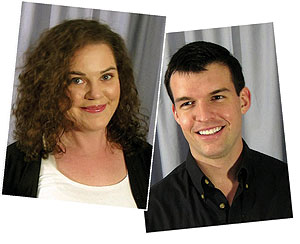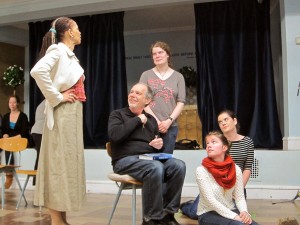
Lizzy and Darcy. – Photo by Elizabeth Hunter
By Sanjeev Selvarajah
Elizabeth Bennet and Fitzwilliam Darcy – two stars on opposing teams – collide into a fit of character traits and heated exchanges that can be best encapsulated by the title Pride and Prejudice, a Jane Austen novel that Elizabeth Hunter has recently adapted, written and directed, for theatre. Jane Austen, the author of this social satire, had great affection for both her pivotal protagonists, but the writing focuses primarily on Ms. Bennet’s impending willingness to learn that there are lines to draw between her conceptions of intrinsic pride and intrinsic prejudice.
Mr. Darcy is one of the good guys; he himself reaches an understanding of Elizabeth, a love he falls for, before Elizabeth can even diminish her distaste for his apparent aloofness. As the writing enters its second act, Darcy uncomfortably encounters Elizabeth as a sight for sore eyes, a volatile one, but one worth seizing for the day, despite the burns and fireworks that may result when he comes too close to her brilliant resentment. “What’s really great about this play is that at first Darcy is a proud and pretentious character, but by the second act, he’s very intricate – ultimately he’s in love,” says J. Keais Pope, the actor who portrays the hero. Keais spent St. Patrick’s Day resting after enduring Medical School applications. He awoke in the evening to two pleasant beers at a local stomping ground. The model Pope follows thus far in his performance is the Colin Firth-rendition.
It dawns on the leisure class Darcy that he can find happiness with a member of a decreased social standing. “It follows the original novel very closely,” he also reiterates, as Hunter hinted at, in discussing this play, which premiers Opening Night Zombie Bash on March 23 at the Somerville Theatre and runs until March 31. An element of novelty for this adaptation, Hunter adds is not only the fun and celebration but also something as small as the Bennet sisters dancing at local estates.
Hunter mentions that Darcy she believes is the character that is most dynamic because he “undergoes real change”. Ms. Bennet and her traits do not experience alteration, only her perspective of the man in front of her undergoes a highlight and appreciation. “It’s very fast-moving and focuses on Austen’s fantastic use of language” says, Elizabeth Hunter who is no stranger to directing actors having performed very recently as Dr. Dysart in the Equus run of Theatre@First. “The turning point of this play is when Elizabeth tells him she would have refused him more politely if he had behaved more gentlemanly,” says the writer/director.
Despite the magnetism between the two characters, Ms. Bennet is definitely the main character. It is her judgment on top everything, the dialogue, the dances et cetera that determines the crux of the play. “When Lizzy first meets Darcy, she sees a man well above her station, ‘out of her league’ and unpleasant on top of that. In her eyes, he is a gentleman by birth but not in actions and therefore she has no reason to respect him as a gentleman,” say Brigid Battell the actress who portrays the heroine. Battell attended to her research of this period piece: “I wanted to get a sense of how the women of the period moved, sat, gestured, the rhythm of their speech. I also looked to the artwork and other literature.” Throughout it all, Battell had one inspiration – “I’ve had the book by my side since day one,” she doesn’t fail to mention.
In the novel, the character that exuded both presence and satire was Mrs. Bennet, Elizabeth’s mother, here played by Dayenne Walter. Walter quickly dismisses a misconception in regards to the character; “she’s not neurotic, she’s on a mission.” Indeed she is a woman of her time, with all of the intent and none of the limitations. “As I read [the book and the script], I became more sympathetic to her; she doesn’t have a filter and says whatever comes to mind,” asserted Walter.
The novel isn’t necessarily English alone. This desire of mothers, heroes and heroines in mismatched social circumstances is seen past the old colonial reaches. The fact that the society of Austen can be learned all throughout the globe is evident not only in prior territories of Great Britain such as India, with its Bollywood rendition of the novel, Bride and Prejudice, but also in colonial lands that can undergo total revolution in culture such as Jamaica, where Walter mentions her mother is from, a location that is possessed by “similar mores,” she puts-it, to marriage, class and happiness.


 https://www.portersquarebooks.com/
https://www.portersquarebooks.com/













Reader Comments